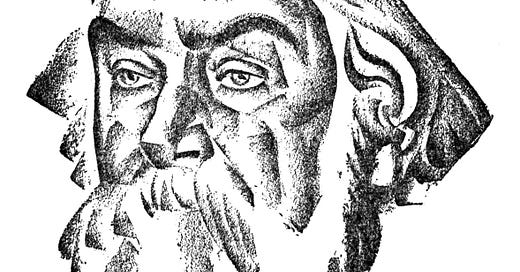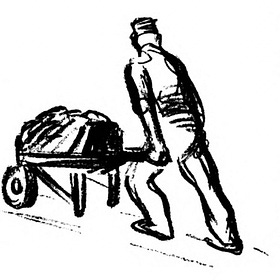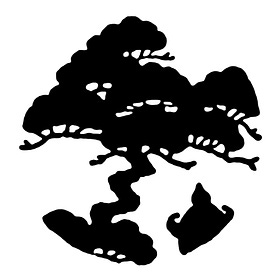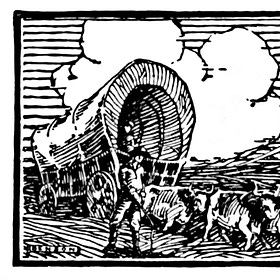Charles Erskine Scott Wood - 5 Very Short Poems (1877-1925)
Forgotten Poems #82: Portrait by Hugo Gellert
—: Untitled (1877) :— I have seen war. I have heard it. I have smelled it. Even now I am waked from dreams By the stink of bodies Three days dead under the sun. Maggots filled their mouths. Flies crawled over their eyeballs, Buzzing up angrily as we threw Manhood into the pit of putrefaction. Weeds will grow upon the lips of lovers And grass flourish out of the hearts of fathers, But the father and lover Will return no more.
—: The Mammon Monster (1918) :— See a monster. His feet are of gold; his hands are of gold; Golden is his head and his legs are golden. His heart is of clay. His greedy hands are folded upon His swollen belly. Into his maw flows an endless procession: Men with grey faces, women with sunken eyes, And the little children who have never laughed.
—: Silent Days (1925) :— The birds have fled, Snatching as they went a morsel from The lean, brown fingers of the haggard year. The leaves are dead. No more the air is fretted with the wings of beetles; Birds no more flutter; no clicking of grasshoppers. Withered stalks have shed their seeds. Wild roses stand by the pebbled rills And tell their beads.
—: A Fragment (1924) :— On this high mountain cliff, Which once the sea waves tore, A fluted shell, frail blossom of that timeless shore. I shall pass, I and all my braggart thought, As dies on space a sounding bell; But here on this dead shore, in the great lap caught, A little fluted shell.
—: First Snow (1923) :— The cows are bawling in the mountains. The snowflakes fall. They are leaving the pools and pebbled fountains: Troubled—they bawl. They are winding down the mountain’s shoulders Through the open pines. The wild rose thickets and the granite boulders In broken lines. Each calf trots close beside its mother And so they go, Bawling and calling to one another About the snow.
“My heart is sick and sad. From where the sun now stands, I will fight no more forever.” (Chief Hinmatóowyalahtqit, as recorded by Wood)
Charles Erskine Scott Wood (1852-1944) was born in Erie, Pennsylvania, lived in Portland, Oregon, and then Los Gatos, California. Served as a lieutenant in the Nez Perce War of 1877. Afterwards became staunchly anti-war, and worked as a lawyer in Portland, where he represented so-called “radical” trade unionists, birth control activists like Margaret Sanger, anarchists like Emma Goldman, advocated for indigenous Americans, wrote for socialist journals like Liberty and The Masses, and was a member of the American Anti-Imperialist League. Identified as a 'philosophical anarchist', and counted among his friends Hinmatóowyalahtqit, a.k.a. Chief Joseph, of the Wallowa people, Emma Goldman, novelists Mark Twain and John Steinbeck, and photographer Ansel Adams, among others. Also became known for his watercolor paintings.
“The reader must also be a poet. Nothing is immortal but poetry endures.” (Wood, Maia: A Sonnet Sequence, 1918)
Was a respected member of the Portland and California literary scenes, though much of his poetry has been forgotten. His early poems from the 1870s, recorded in the diary he kept during the Alaska and Nez Perce Conflicts, show a clear influence of Walt Whitman, and Wood remains an early advocate of American 'free verse', though these poems remained unprinted until the 1918 revision of his book, The Poet In The Desert (first published in 1915), a striking 112 page anti-war poem, one of the few true “epics” of the Modernist era.
“Another California poet commands special attention. He is Charles Wood. When he writes in the form that Walt Whitman used, he shows both his cosmic breadth of feeling, and his artistry, which is superior to the great Whitman's, as you can see if you compare the work of the two.” (Troubador, 1929)
—: After Charles Wood :— By Dick Whyte I. war is hell? no—war is not hell, people do not go there after they die but in order to die facing the faceless: each name has many mouths II. war is not a slogan— not a feeling not a concept not a theory not a lesson not a question not an answer not an object not a subject not a project war is a field swallowing bodies nobody bothered to bury III. everyone who dies in war dies for nothing nothing to cheer nothing to celebrate nothing to commemorate nothing to glorify nothing to honour nothing to be proud of nothing to sing of nothing to speak of nothing survives what nothing survives, not even grief IV. war is not poetry war is nothing but death— senseless meaningless pointless purposeless valueless fruitless needless aimless bottomless death V. the prophet's name is profit & the priestess couldn't weep for there was too much to be undone VI. mourn not those who died but us who continue to justify their deaths & let no warlords sleep, drive them mad with dawn for the future is born from a river flowing down a mountain, & we are the stones rubbed smoothed by time
Forgotten Poets Presents:
Forgotten Poems, a living anthology of obscure and out-of-print poetry from the late-1800s and early-1900s. Explore the archives:
Laura Riding - Mortal (1925)
—: Mortal :— There is a man of me that tills. There is a woman of me that reaps. One is true And one is fair. Scarce I know where either are. But I am seed the man should give And I am child the woman should bear...
Pauline B. Barrington - "I Was A Year In The Trenches" (1917)
I was a year in the trenches Among the tear and spatter Of shrapnel. Among headless men, twisted men, mad men In masses, Under the scream of shells Blossoming overhead...
More poems about mountains . . .
Virginia McCormick - Mountains (1922)
—: Mountains :— I turn my back upon the mountains, The lazy mountains Sleeping in the sun. They bring me peace, A profound satisfaction with self, A desire to rest always...
More poems about the sea . . .
Walt Whitman - 3 Very Short Poems (1860-67)
Walt Whitman isn’t exactly ‘forgotten’, but much of his poetry has been. Today, Whitman is typically remembered for his grandiose, often bombastic, cosmic poems, and his strident, declarative tone...
M.R. Lowe - Old Burying Ground (1928)
—: Old Burying Ground :— A thin gray stone crumbling and worn leans over a rectangle of daisies and tall grass. “Orena Consort of.................. Born Ap...... ..2, 1798 D..... …........1845...
More poems about monsters . . .
Leon Srabian - The City (1925)
—: The City :— The city is a monster Swallowing what comes within its reach. The groves on the hilltops Are perturbed sentinels Warning the fields. But the city is a far crawling dinosaur, With its factory-claws Already at the vitals of the field...


















"war is a field/swallowing/bodies/nobody bothered/to bury" and "war is not/ poetry/ war is nothing/ but death"
These two are thought-provoking. I keep reading them over and over. Love this piece!
These are so powerful. At first when I read the date 1918, I thought he might have been writing about WW1 and I thought of Wilfred Owen and his poetry of war. Your poem is outstanding. So powerful. War is not poetry.